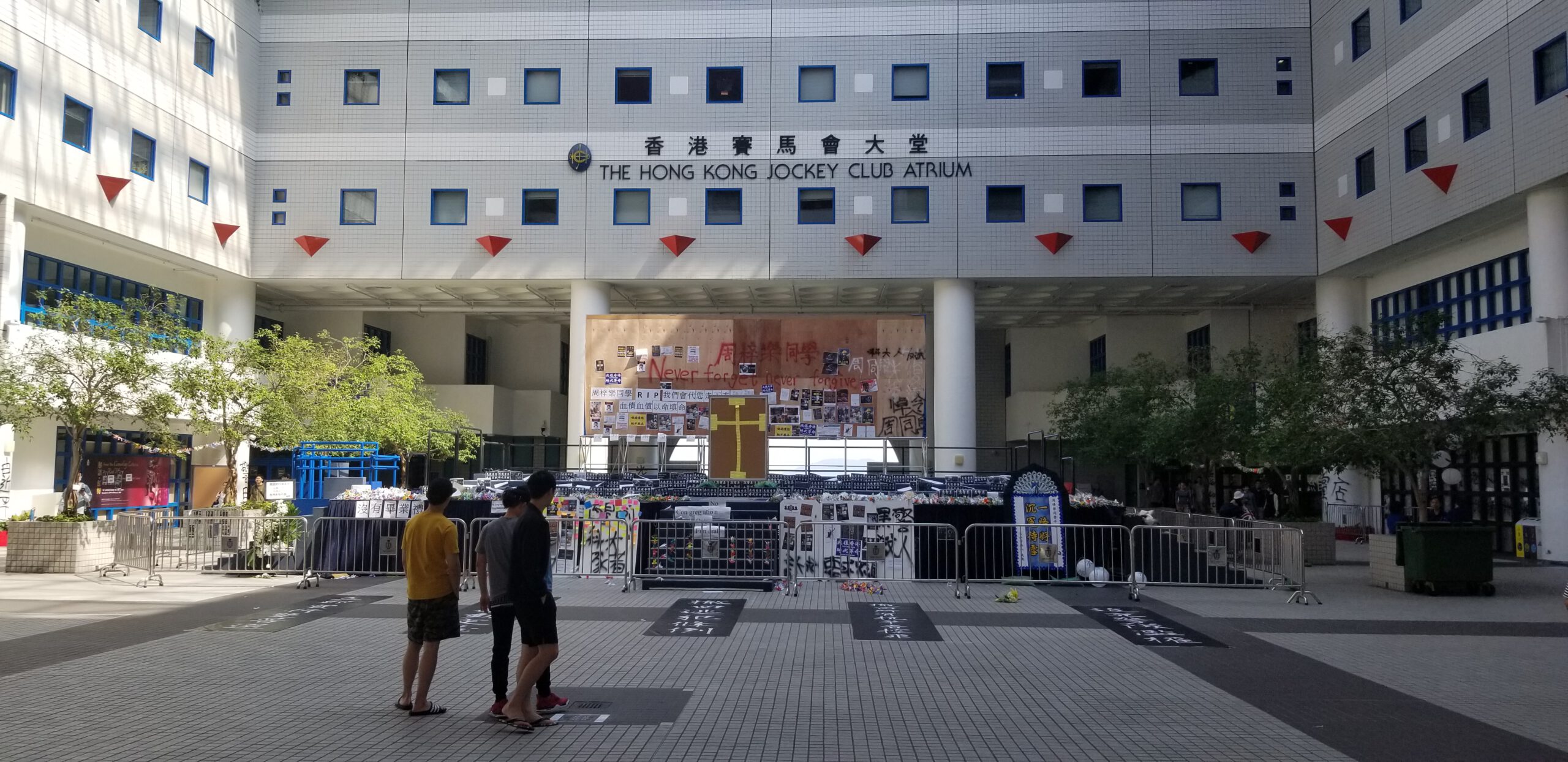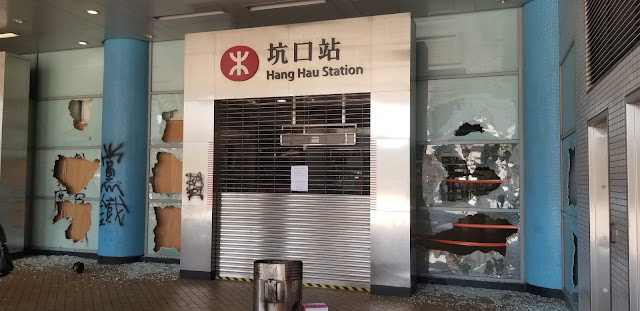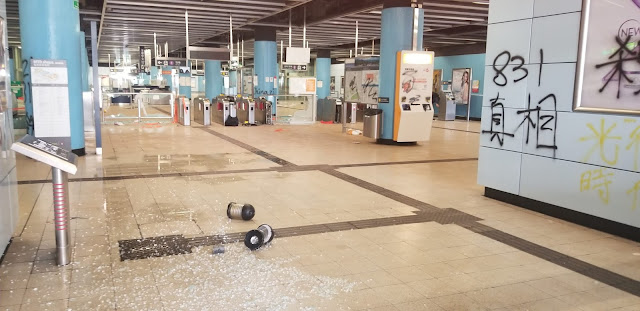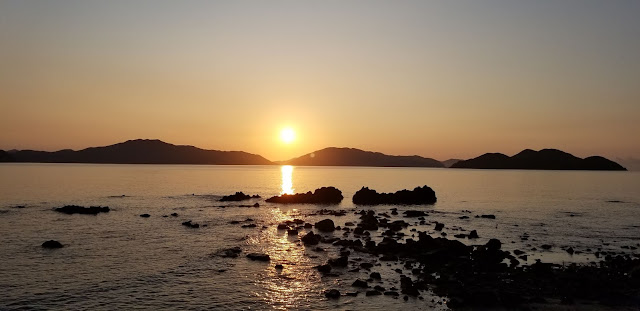(Also published on Medium)
Introduction
Yesterday, on less than a day’s notice, I had to bid farewell to some of my closest friends, one of whom I might never see again. Certainly, none of us expected how our life would unfold when myself and countless other international students accepted the offer to move to Hong Kong to start University. Without getting too political, I wanted to share my experiences as an international undergraduate student during the past months.

Background
The first indication that studying in Hong Kong might be a more unique experience than I thought, came when much of Hong Kong peacefully went to the streets in June 2019 to protest against a proposed extradition bill. It was feared that the law, which would allow the government to extradite people to Mainland China, would limit certain freedoms in the semi-autonomous special administrative region, that is Hong Kong. And while the bill has since been formally withdrawn, protests have evolved into a broader anti-government movement, fighting for five demands, which include, among others, creating an independent inquiry into alleged police brutality and universal suffrage.
Arrival in Hong Kong
A week before I moved to Hong Kong, protesters shut down Hong Kong International Airport. Worried about having my flight cancelled, I travelled nine hours from Beijing on the new high-speed railway. Fortunately, the airport took certain security measures to prevent such an event happening again, but it was still good to be on the safe side.
The first few weeks of university were exciting and not much different from any other first-year college experience around the world. It’s surprising how easily one can get into the routine of small talk and self-introductions when one is bombarded with orientation activities for two weeks straight. However, after the usual “Where are you from? and “What school are you in?”, questions regarding why we had chosen to come to Hong Kong would arise, “Aren’t you worried about the protests?”. My background made it easier to explain why I would come to Hong Kong, especially during these times. Having lived the international experience for six years as a German Canadian teenager living in both Shenzhen and Beijing, China, I felt ready to move to this city, which I was already relatively familiar with. Especially, my upbringing in the contrasting political systems of both Germany and China would allow me to better understand both sides of the protest movement and come to Hong Kong with a more open mind.
I met some really amazing people here who have been incredibly supportive this entire time. We would take casual weekend trips to the city centre, and when we encountered protest rallies, it would make for a more exciting experience. Of course, we’d still try to avoid those encounters, but strangely, we would bond over that fact that we are all living part of Hong Kong’s history.
At that time, isolated violent clashes and the occasional tear gas round fired would make top news.

First Signs of Trouble
The first time I got the chills was when the university’s president hosted an open forum to discuss the situation and how students and the university would deal with issues arising from protests. It wasn’t until the whole lecture theatre began shouting protest chants, that I realised just how deeply emotional the issue was to the Hong Kong people. I was also taken by surprise by how involved the local community at my university was, with people shouting at the president himself.

Fast forward two months. Weekend protests across the city have since become the norm. From the perspective of us international students, the situation began presenting us with major inconveniences. Whenever we wanted to go to the city for shopping or sightseeing, we would have to check the news to make sure we didn’t accidentally end up in one of the many flashpoints around town.
Certain actions merely became an inconvenient annoyance. During several evenings while I was doing homework in my dorm, I was disturbed by the chanting of “Free Hong Kong!” or “Revolution of our times!”. Small groups of students had obtained megaphones and were parading past the student halls at ungodly hours, keeping residents from falling asleep. Whenever that happened, my roommate and I would just look at each other, exchange sighs and plug in our headphones.
A Paralysed City
The most violent days the city had ever seen came at the beginning of October, around the time of China’s national day. More than 1,300 rounds of tear gas were fired in one day and countless protesters were arrested. With the government invoking emergency powers to outlaw the wearing of masks at demonstrations, widespread vandalism engulfed the city. Metro stations across the city were damaged so badly, the MTR decided to close down the entire subway system.


The city became completely paralysed. That day, my university decided to suspend all classes past 6 pm and all campus facilities were closed. It was also my birthday, so I didn’t really know how to feel about the situation. Most of my friends decided to stay on campus, after all, it was almost impossible to get anywhere with public transportation at a standstill.
The next day, I headed into the city and discovered first-hand the scale of the previous day’s destruction. ‘Hang Hau’, my usual go-to subway station, was completely destroyed. Every glass panel, turnstile, TV screen or ticketing machine had been shattered, spray-painted or vandalised in other ways; at one of the exits, water was gushing out of a broken sprinkler. I obviously wasn’t going to take the subway that day, so I kept walking. The roads were almost completely empty, traffic lights had been destroyed and metal barriers on the side of the street were missing. I felt like I was in a movie.
In the following days, the atmosphere on campus slowly began to sour. The fact that a protester was shot with live ammunition in the days prior, added plenty of fuel to the emotional fire; frustration and anger now seeped into our own community. I was on the way back to my hall after the last class of the day as security guards prevented me from entering part of the main courtyard. A group of students had been confronted by university management after they began boycotting the main cafeteria. On the same day, students with opposing views hurled verbal abuse at each other before eventually turning physical. We received an email from the President of our University that evening, pleading for people to remain calm, to my surprise that is exactly what happened.
It seemed like protests had reached their peak and the city was now recovering from what have been the most violent times in its history. While classes remained cancelled past 6 pm for the rest of the week as the MTR Corporation scrambled to repair facilities in order to incrementally reopen metro lines, everyday life gradually returned to normal.
Throughout this turmoil, professors were being incredibly supportive, arranging for extra office hours, video recording certain lectures and extending deadlines. It was fascinating just how supportive the university community could be, even with isolated on-campus escalations.


Death
Unfortunately, just as prospects seemed to brighten, things dramatically turned for the worse. After faintly hearing the yelling of crowds in the main atrium, my friends and I pursued our curiosities and headed to the source of the noise. A large crowd of students had surrounded a couple members of the university leadership team and were furiously exchanging opinions. They were joined by several cameramen and other members of the press. We quickly found out that one of our second-year computer science students had fallen from height in a car park and was said to be in critical condition. Supposedly, riot police were conducting a dispersal operation in the area, and while the circumstances of the fall remained unclear, students started asking questions.

On the following day, the president hosted another forum, this time on the large, recently erected congregation stage in the main atrium. The entire community was invited to participate. I stood and watched as students and faculty came up one by one, asking the president questions. Unfortunately, with each question, anger and frustration grew. The president was often interrupted by protest chants and masked members of the community used the opportunity to directly challenge the president, demanding repeatedly that he condemn the Hong Kong Police Force. Responses from the university management seemed to dodge almost all politically sensitive questions, leading me to doubt the effectiveness of this open discussion. To this day I struggle to form a conclusion about how the university dealt with the crisis. On the one hand, I completely understand and that a university should remain a neutral educational facility, but I wonder how strictly this policy can and should be followed during unprecedented crises such as the current one.

I increasingly felt uncomfortable. Emotion seemed to mount and mask-wearing students left and right of me began holding up posters. I eventually decided to return to my dorm where I continued following the dramatic proceedings through a live stream. By the time I finished watching, I felt sick to my stomach. It was hard to imagine how much frustration could engulf the entire university community.
A few days later we, unfortunately, were informed about the tragic passing of our schoolmate who succumbed to his brain injuries after unsuccessful attempts to save him. Although I never knew him personally, it still deeply affected me. Regardless of the political significance, all I could think of was that parents had lost a son, whom they sent off to study for a future he will never be able to live. That day will remain in my memory for a long time. The university’s graduation ceremony was cut short and all classes were cancelled with immediate effect. Within hours, protesters took over our campus and a destruction run began. The main canteens and restaurants, as well as the Bank of China, the on-campus Starbucks store, as well as the president’s private residence, were attacked by black-clad protesters. Graffiti and posters began covering nearly every free wall around the important sites.





Up until that point, our campus had always been a safe haven, a place away from the unrest in the city and a place where the sole focus was education. This is also what I would tell my family, who became increasingly worried about the unstable situation in Hong Kong. But I could no longer tell them that the protests didn’t affect me.
Escalation
In the following afternoon, we received an email informing us that school would remain shut for another day. Then the next afternoon, we received an identical email, and the next day again… It had almost been a week since the big event and all facilities were still closed. We watched the news with awe as protesters besieged other major Hong Kong universities. At one point the Chinese University of Hong Kong (CUHK) was completely occupied, with students erecting brick walls on the roads leading up to their campus. The canteen had been taken over and was now used as home base, with food and supply donations flooding in to support the protesters who were fighting off riot police day and night. Knowing how close university communities in Hong Kong are, it was a scary sight to watch. Within a day of those occurrences, we received the fateful email.
Dear Students,
Given the escalation of unrest at sister universities last night, the management has decided to temporarily change the University’s mode of instruction. For the remaining two and a half weeks of the term, there will NOT be any face-to-face classes or any proctored on-campus final examination on the Clear Water Bay campus. Classes will be conducted through on-line means starting next week. Final examinations or alternate arrangements will be announced by the instructors of the courses. This will accommodate students who may want to leave campus before the end of the term. Faculty members of individual courses will email students on more detailed arrangements of their courses.
Sincerely, Provost
My friends and I were catching up on schoolwork as we opened our mailboxes to that message. We regrouped, discussing our options and brainstormed how we could proceed. The uncertainty and confusion were unbearable.
Almost immediately, students began booking flights back home. My roommate left for the Philippines, my friend’s roommate for Taiwan, most Indian students back to India, and all local students I knew returned to their family. Within a few hours, the entire Korean community had decided to fly out the next morning and exchange students were being recalled by their home universities. I even read that China Airlines was chartered to evacuate 81 Taiwanese students from CUHK the same evening.

One of our first contingency plans in our friend group was the half-hearted idea to just head off to a tropical country and wait out the unrest there. Curiously, we were all on board. However, within hours, it was clear that some of our friends’ parents wanted their children to go home. It didn’t help that Western media dramatically portrayed Hong Kong society in a way barely distinguishable from anarchy. Multiple countries issued travel warnings and insisted its citizens be evacuated from Hong Kong. People left and right of me began frantically packing bags and booking flights, while I was left with no clue what to do.
So much happened so quickly. That evening, my two Norwegian friends were interviewed by their country’s national news to give their personal testimony of the situation. Later, one of them also decided they would transfer to a British university. That same evening, the main courtyard by the student halls was occupied by students and their luggage waiting for a hastily arranged ride to the airport. Later that night, we had more teary goodbyes than anyone had wished for. Over the course of half a day, we went from believing we’d all finish the semester together to swallowing the fact that we won’t be seeing some of our closest friends for a long while, and maybe even never again. This was the most lost and confused I had felt in a long time; it all felt very surreal.
Letter from the president of our university:
Dear members of the university community,
Hong Kong society is currently fractured, with deep divisions across social groups, political parties, and even amongst family and friends. The past week has seen a rapid escalation of violence and confrontation throughout Hong Kong. Several university campuses have been in turmoil. …There will be further announcements on academic and administrative arrangements to be issued by the Provost and the Vice-President for Administration and Business respectively. We will do whatever we can to communicate and to help. Please take care.
Our Final Solution
Events like this have never occurred in the history of Hong Kong and none of us had ever experienced anything like this. How does one even deal with such a crisis? Following all the chaos of the previous days, campus suddenly turned into a ghost town. The main academic building that was usually bustling with activity at all hours of the day had turned eerily empty, the halls became sparsely occupied and pretty much everything on campus, including restaurants, the library and sports facilities were closed.
Although our campus was and still is safe to live in, the mere loneliness this place would face for the next weeks prompted the remaining six of us friends to reconsider the option to leave Hong Kong. We quickly decided to make the most of the situation by continuing our studies online in Thailand, as this was the cheapest and quickest fix to the problem.

So that was our solution, we could focus on our studies through online means without the emotional weight and the distractions of Hong Kong. A solution to the crisis in Hong Kong? Unfortunately not in sight. I can only hope life will soon return to normal because this amazing city has so much to be proud of.
If you’ve made it this far into my little essay, thank you. I want to stress that although I’ve probably described most events in the most dramatic way possible, the past few months as an international student in Hong Kong have been simply amazing. Especially the people I’ve met along the way have made this experience so incredible and I am grateful to have such amazing friends who made my first-semester college experience so impactful. I never regretted coming here.







